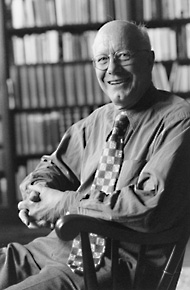![]()
Departments
![]()

|
27 August 1999 |
Vol. III, No. 4 |
Feature
Article
A new addition to the world of new editions
Editorial Institute to offer instruction by the book
By Eric McHenry
The text of an advertisement for BU's Editorial Institute includes the following dictionary-format definition of edit: "To publish, give to the world a literary work, indispensibly and imperfectly . . ."
Christopher Ricks, CAS Core Curriculum professor, shakes his head at a photocopy of the ad, which after suitable revision will appear in an issue of Harper's magazine. Indispensibly, he laments, is a misspelling.
"At least we've got imperfectly in there as well," he says.
The Editorial Institute is a brand-new enterprise, and it will be a while before all the rough edges of its packaging and promotion are smoothed. But Ricks, who will codirect the institute with UNI Professor Geoffrey Hill and a third scholar yet to be hired, is excited about bringing such a distinctive program into being.
Offering both an M.A. and a Ph.D., the Editorial Institute will train students in the creation of "textually sound, contextually annotated" book editions and monographs. To the best of his knowledge, Ricks says, it is a program without cognate at other colleges and universities.
"Virginia has a very good program in rare books and bibliography," he says. "There is an advanced degree in the printed book at the University of London, but it's an M.A. program, not a doctoral program, and it's lodged within English studies. Whereas it is our intention that this program will help people with editorial work across a whole range of disciplines."
The institute's advisory committee, comprising scholars from throughout the humanities and social sciences at BU, reflects this intention. Disciplines such as philosophy, the classics, modern languages and literatures, political science, theology, and law are represented. And Ricks says the committee's composition is still a work in progress.
In recent decades, according to Ricks, textual editing -- the process of preparing a text for publication, which entails consideration of authorial intention, manuscript evidence, and the strengths and shortcomings of previous editions, among other things -- has faded as a focal point of serious graduate study. But the world has no less a need for skilled editors, editorial scholars, and librarians than it ever had. The Editorial Institute, therefore, holds the potential to make not only a viable but a vital contribution to scholarship and publishing.
"When I was young, graduate studies in many subjects, including English, were if anything far too insistently editorial," says Ricks. "Now there are honorable changes of conviction about studies. There are also swings of fashion, which have both an honorable and a dishonorable side. But when I was a graduate student at Oxford, probably far too many people did editorial work, and there was something like a contempt for certain sorts of literary history, literary theory, and biographical work. What you have now is the belief -- in some ways well-founded because these things are self-fulfilling prophecies -- that you can't get a job unless you talk a lot about literary theory. It's swung round so that editorial studies, which used to loom very large at the graduate level, have fallen rather out of favor. But they remain very important."
|
|
|
Christopher Ricks |
"There's been a change in the community of what people know," Ricks says. "It used to be much, much clearer what counted as being well-read. There was one classic 19th-century anthology of English literature; everybody knew Palgrave's Golden Treasury. Today, it's not that people don't know any anthologies, but there's no one anthology that everyone knows. So there's more not to know, and there's much less agreement about whether it's desirable that we should all know the same things."
The institute is the brainchild of Geoffrey Hill, who in early 1997 forwarded to Ricks a copy of a proposal for a program in editing that would focus almost entirely on religious literature of the 16th and 17th centuries. "It would have been degree-granting," Ricks says, "but much more circumscribed." The proposal was, at the time, up for consideration by University administrators, and Hill was asking for Ricks' collegial support. Ricks replied that he was interested not only in supporting such a project, but in widening its sights and participating in its development.
Ricks says the institute's first wave of students will probably enter in September of 2000. The doctoral program of study, as currently conceived, will include courses in the theory and practice of literary editing, textual scholarship and modern technology, annotation, and editions, among others. It will also, according to the institute's literature, entail directed study toward the production of "editions of important writings, with textual apparatus and annotation, or monographs with an editorial dimension." One advantage such projects may hold over the traditional master's thesis or doctoral dissertation, Ricks suggests, is the relative timeliness with which they can be completed -- a benefit both to the institute's students and to their advisors.
"Many, many doctoral students today are taking on dissertation projects that are inordinately large -- looking at the effects of industrialization on all Anglophone literature for 100 years, for example" Ricks says. "You'd have to be Isaiah Berlin even to read such a book.
"A project in editing can be much more realistically estimated in advance of doing it," he says. "What's hoped for here can be summarized with a line from Robert Graves: 'But nothing promised that is not performed.'"
